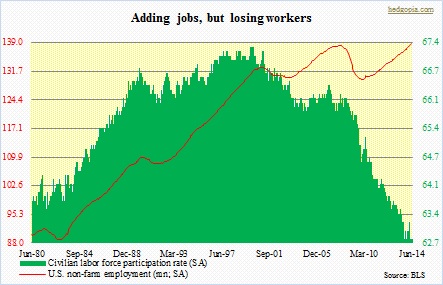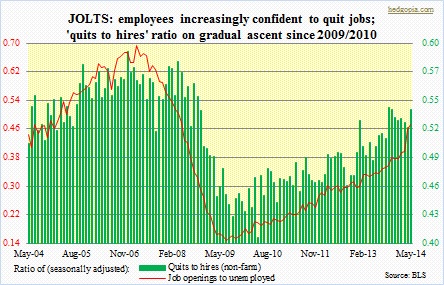 Jobs have been relatively hard to come by in the current economic recovery. From the January 2008 high of 138.37mn, U.S. non-farm payroll nosedived all the way to 129.66mn by February 2010, for a loss of 8.7mn. It took four-plus years to recuperate all that loss, with this past June coming in at 138.78mn. To boot, U.S. population increased 9.5mn, to 318.4mn, between the periods. Whenever a recovery is this tentative, employees tend to lack job security, leading to a lack of confidence to quit and look around. Not only do they not muster strength to ask for a raise, employers also do not feel the need to take the initiative themselves. Translation: stagnant wages, which is the case today. In recent months, nominal wages are showing some life, even as real ones are only marking time. In this context, anytime there is an increase in employee conviction, it should be viewed as positive from the viewpoint of stability in the jobs market.
Jobs have been relatively hard to come by in the current economic recovery. From the January 2008 high of 138.37mn, U.S. non-farm payroll nosedived all the way to 129.66mn by February 2010, for a loss of 8.7mn. It took four-plus years to recuperate all that loss, with this past June coming in at 138.78mn. To boot, U.S. population increased 9.5mn, to 318.4mn, between the periods. Whenever a recovery is this tentative, employees tend to lack job security, leading to a lack of confidence to quit and look around. Not only do they not muster strength to ask for a raise, employers also do not feel the need to take the initiative themselves. Translation: stagnant wages, which is the case today. In recent months, nominal wages are showing some life, even as real ones are only marking time. In this context, anytime there is an increase in employee conviction, it should be viewed as positive from the viewpoint of stability in the jobs market.
 One of the ways to judge the underlying strength in this regard is the quit rate. The accompanying chart is based on the Bureau of Labor Statistics’ Job Opening and Labor Turnover Survey. As is evident, the quits-to-hires ratio plateaued in May 2010, and following a gradual move higher, has gone sideways the past several months, perhaps suggesting that employees are increasingly getting comfortable looking around for new opportunities. Indeed, since the end of Great Recession, ‘quits’ has risen 42 percent to 2.5mn, even as ‘hires’ has grown 29 percent to 4.7mn, so the heavy-lifting behind the rise in the ratio is being done by the former. Another ratio in the chart – job openings to unemployed – also shows openings are getting healthier, which should naturally imply that more employees will feel comfortable quitting and looking around. This will obviously have implications. If sustained, employers will need to raise wages, which is exactly what is being forecast by NFIB’s survey of small-business compensation plans. Once again, this blogger has not wholeheartedly bought into this hunky-dory scenario, nevertheless is aware of the phrase “when the facts change, I change my mind”.
One of the ways to judge the underlying strength in this regard is the quit rate. The accompanying chart is based on the Bureau of Labor Statistics’ Job Opening and Labor Turnover Survey. As is evident, the quits-to-hires ratio plateaued in May 2010, and following a gradual move higher, has gone sideways the past several months, perhaps suggesting that employees are increasingly getting comfortable looking around for new opportunities. Indeed, since the end of Great Recession, ‘quits’ has risen 42 percent to 2.5mn, even as ‘hires’ has grown 29 percent to 4.7mn, so the heavy-lifting behind the rise in the ratio is being done by the former. Another ratio in the chart – job openings to unemployed – also shows openings are getting healthier, which should naturally imply that more employees will feel comfortable quitting and looking around. This will obviously have implications. If sustained, employers will need to raise wages, which is exactly what is being forecast by NFIB’s survey of small-business compensation plans. Once again, this blogger has not wholeheartedly bought into this hunky-dory scenario, nevertheless is aware of the phrase “when the facts change, I change my mind”.

